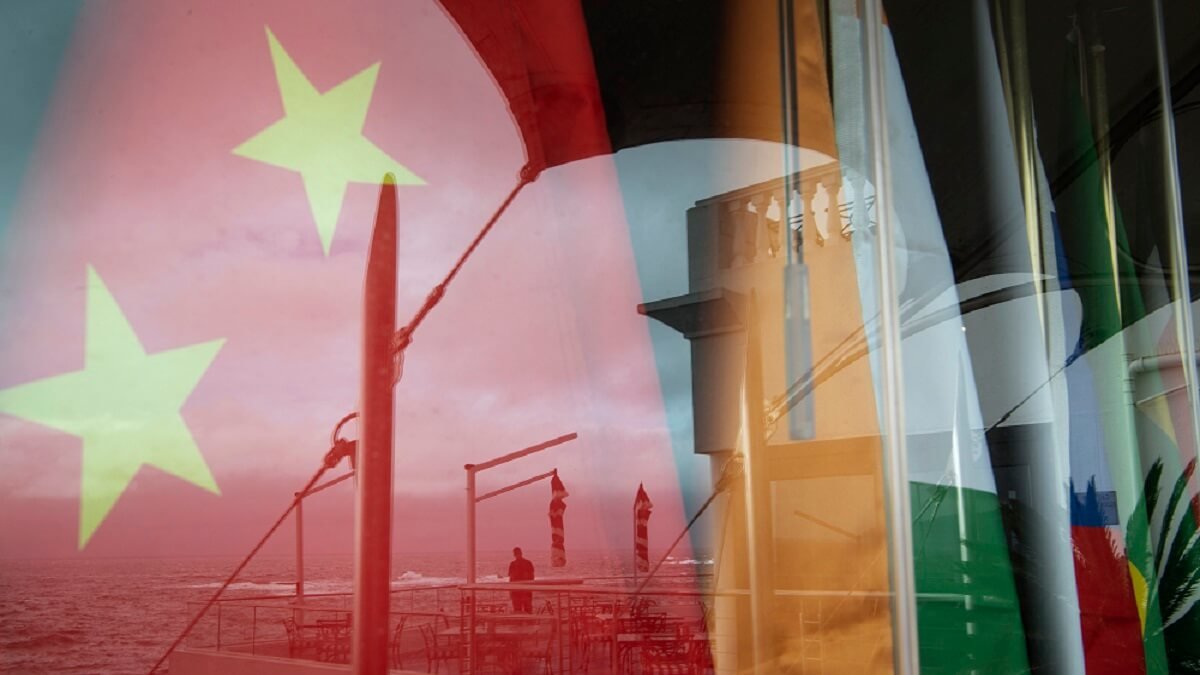The Brics economic group, consisting of Brazil, Russia, India, China, and South Africa, is discussing the possibility of expanding its membership and promoting the use of local currencies for trade settlement, with aims to challenge the dominance of the US dollar, but analysts believe that the greenback is unlikely to lose its status as the international reserve currency.
BRICS, comprised of Brazil, Russia, India, China, and South Africa, now represents almost a third of global GDP and is surpassing the economic influence of the G7, with over 40 nations expressing interest in joining.
The BRICS alliance, consisting of Brazil, Russia, India, China, and South Africa, has decided to invite Argentina, Egypt, Ethiopia, Iran, Saudi Arabia, and the United Arab Emirates to join their economic coalition, according to South African President Cyril Ramaphosa.
The BRICS summit is aiming to reduce reliance on the U.S. Dollar, as the coalition confirms new members including UAE, Egypt, Ethiopia, Saudi Arabia, and Argentina, and discusses the possibility of a new payment system and currency backed by gold.
With major oil exporters joining BRICS, analysts suggest that the adoption of local currencies for trade among BRICS countries, rather than the US dollar, is becoming more natural, potentially reducing transaction costs and weakening the role of the petrodollar.
Egypt hopes that its inclusion in the BRICS bloc will help alleviate its shortage of foreign currency and attract new investment, although analysts suggest that it may take time before the benefits become evident.
BRICS is considering making local currencies the only accepted form of payment for oil and gas settlements, which could potentially shift global power from the West to the East.
The BRICS 2023 Summit saw the expansion of the alliance with the addition of six countries, potentially leading to a shift in the global economic order and significant de-dollarization efforts, while notable absences by Vladimir Putin and Chinese President Xi Jinping raised concerns, and China and India made progress in their border talks.
The expansion of BRICS to include Iran, Saudi Arabia, Egypt, Ethiopia, Argentina, and the United Arab Emirates will make the bloc represent 46 percent of the world population and 37 percent of global GDP, but China's economic dominance within the group raises questions about whether it will truly be an "equal partnership."
Saudi Arabia, as a new member of the BRICS economic alliance, plans to invest $16 billion from its foreign reserves, signaling a shift towards prioritizing investment over reserves and potentially bolstering the bloc's ongoing initiatives.
The BRICS expansion and their de-dollarization efforts have been met with a relatively calm response from the US, Germany, and the European Union, emphasizing the importance of countries choosing partnerships based on their national interests.
The BRICS bloc, which has now expanded to include 11 countries, controls 30% of the global economy, 46% of the world's population, and a significant share of commodities such as manganese, graphite, nickel, and copper, as well as 42% of the global oil supply, potentially putting pressure on the US economy and challenging the traditional world order.
China is working to establish a new global oil market order by building alternatives to the West's world order, including the invitation of Saudi Arabia, Iran, and the UAE to join the BRICS political and economic grouping, which would control around 41 percent of all global oil production.
The extended BRICS alliance, which now includes six new countries, has a GDP in purchasing power parity (PPP) that accounts for more than one-third of the global economy, giving them the potential to control exports of oil to the West and influence trade settlement currency choices.
Leaders from Brazil, Russia, India, China and South Africa recently announced that Saudi Arabia, along with five other nations, would be invited to join the BRICS organization, potentially causing fears of economic catastrophe in the U.S., although experts argue that this scenario is highly unlikely.
The BRICS expansion, which includes countries like Saudi Arabia, the UAE, and Iran, has raised concerns in the U.S. and EU as it poses a threat to Western-dominated financial markets, while China's influence grows and the alliance aims for de-dollarization in global trade.
The BRICS group invited six new members, including Saudi Arabia and the United Arab Emirates, indicating a move towards energy dominance and diversification, but internal divides and strategic rivalries within the bloc may hinder its ability to challenge the current global energy order.
